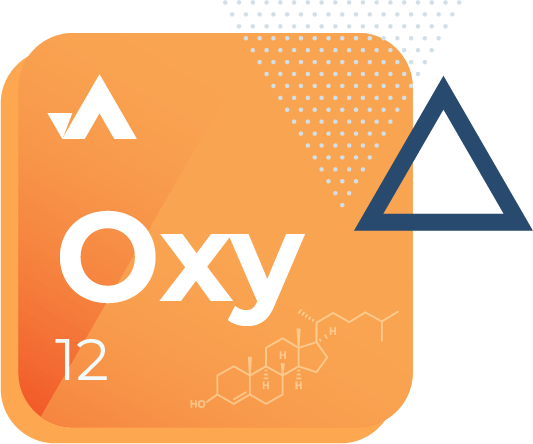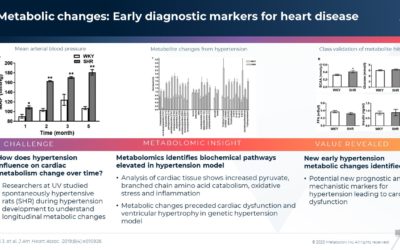
Metabolon Target
Oxysterols Targeted Panel
12 Metabolites
Absolute Quantitation
Rigorous Quality Control
End-to-end Service
About Oxysterols
Oxysterols are intermediates in the development of bile acids, steroid hormones, vitamin D3, and other bioactive markers of inflammation and other disease states. Oxysterols—oxidized products of sterols—are bioactive intermediaries that are associated with certain diseases, and further research is required to understand their role in disease pathogenesis. Oxysterols have the potential to influence many conditions from cardiovascular diseases such as atherosclerosis, to Alzheimer’s disease, diabetes, and cancer. This suggests that further research and understanding of oxysterols may help to better understand these conditions.
A thorough understanding of a disease phenotype is crucial for effective treatment, and metabolomic research into the possible causes of a disease is the next step in the fight for disease prevention. Unfortunately, detecting and identifying oxysterols in untargeted metabolomics can be challenging, and custom assay development is a typical approach to quantifying specific analytes as part of wider research. Choosing an extensive targeted metabolomics provider can offer you confidence in routine quantitation of oxysterols for your research.
The Metabolon Oxysterol Targeted Panel measures 12 oxysterols and related sterols of biological significance. Our validated method of oxysterol detection and identification in human plasma samples may enable you to gain additional insights in your research—helping you to discern whether oxysterols are a significant biomarker for a disease state or inflammatory response within your study and whether their detection can potentially be used as a precursor for medical screening. With over 20 years’ experience helping commercial and academic studies gain insights from metabolomic analyses and with over 2,000 citations in scientific journals, Metabolon is leading the way in applied metabolomics solutions worldwide. Quality is at the core of everything we do. All methods are developed and validated according to ISO 9001:2015 standards, so you can be confident in our ability to match your quality standards.
Oxysterols Targeted Panel Details
Swipe left/right to view the full table.
| LLOQ* | |
|---|---|
| Metabolite | Plasma |
| 24-Hydroxycholesterol | 10.0 ng/mL |
| 27-Hydroxycholesterol | 20.0 ng/mL |
| Desmosterol | 100 ng/mL |
| 7-Dehydrocholesterol | 100 ng/mL |
| 8-Dehydrocholesterol | 25.0 ng/mL |
| Lathosterol | 200 ng/mL |
| 5α, 6α-Epoxycholesterol | 15.0 ng/mL |
| 4β-Hydroxycholesterol | 5.00 ng/mL |
| Cholesterol | 0.125 mg/mL |
| Lanosterol | 10.0 ng/mL |
| 5α, 6β-Dihydroxycholestanol | 10.0 ng/mL |
| 7α, 27-Dihydroxycholesterol | 10.0 ng/mL |
Analysis Method and Instrumentation:
LC-MS/MS (Agilent 1290 UHPLC/Sciex QTrap 5500 and 6500+)
| Sample Type and Required Amounts | |
|---|---|
| Sample Type | Sample Requirements |
| Plasma | ≥ 250 µL |
Others on request
Disclaimer: This panel is for Research Use Only and is not to be used for diagnostic purposes.
Delivering Absolute Quantification for Research and Biomarker Analysis
Our readily available or custom developed quantitative assays help you achieve your research and biomarker validation objectives with precise and fully validated methods. Our targeted assays and panels cover >1,000 metabolites and lipids across a wide range of biochemical classes, metabolic pathways, and physiological processes, and they can be customized to best fit any application.
Oxysterols Targeted Panel Applications
Inflammation
The importance of inflammation in the development of multiple diseases- and health-related conditions including neurodegeneration, diabetes, cardiovascular disease, cancer, and inflammatory bowel disease is undisputed. Metabolomics can inform on inflammatory processes by providing a readout of the small molecules of an organism, tissue, biofluid, etc. This allows for direct molecular phenotyping of inflammation beyond the standard protein markers of typical assays. Metabolon offers several targeted assays, including oxysterols, fatty acids, kynurenine/tryptophan, and a range of others (central carbon, glucose tolerance, branched-chain amino acids, β-hydroxybutyrate) that can also inform on overall cardiovascular health that is often linked with inflammatory processes.


Cardiovascular Disease
Neuroscience
It is well-established that a low-carbohydrate, high-fat ketogenic diet (KD) can help treat refractory epilepsy, which affects more than a third of epileptic patients who don’t respond to existing anticonvulsive drugs. What scientists haven’t understood until recently is how this kind of diet translates to brain activity. The answer for this aspect of epilepsy lies in the gut microbiome. There are many other neurological disorders like Alzheimer’s disease, amyotrophic lateral sclerosis (ALS), Parkinson’s disease and more. While so much remains to be understood about brain science, we do know that metabolomics is uniquely poised to understand the brain because of the ability of metabolites, small molecules, to cross the blood-brain barrier providing unique insights.


Diabetes
Cancer

Big Insights with Metabolon
Cited in over 3,000 publications, we help scientists and manufacturers gain greater insight into their studies through metabolomics. See how our approach can become a successful part of your workflow.
Related Metabolomics Resources
Contact Us
Talk with an expert
Request a quote for our services, get more information on sample types and handling procedures, request a letter of support, or submit a question about how metabolomics can advance your research.
Corporate Headquarters
617 Davis Drive, Suite 100
Morrisville, NC 27560




